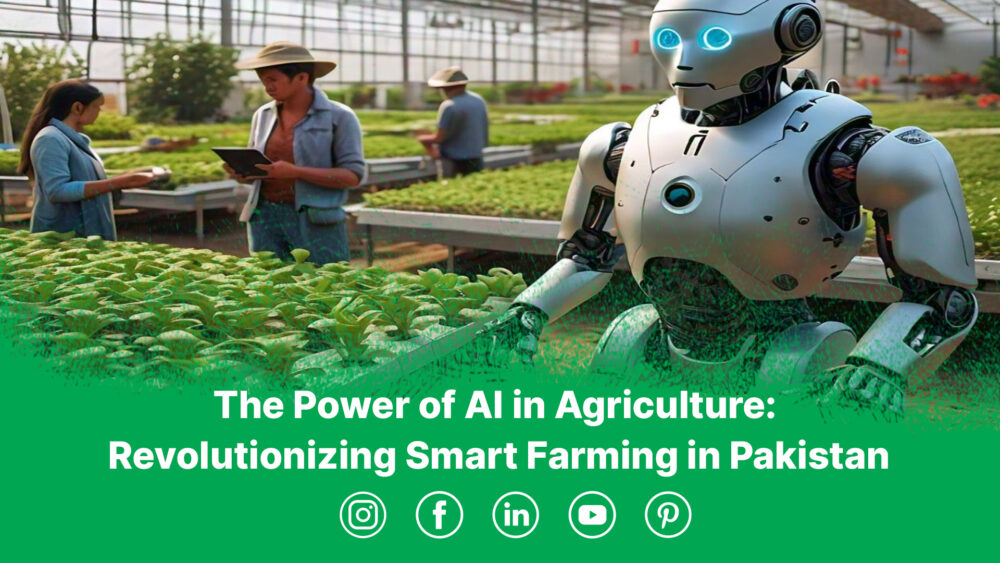Agriculture, the backbone of many economies around the world, is undergoing a significant transformation with the advent of artificial intelligence (AI). The power of AI in agriculture is reshaping the way farming is done, leading to the rise of “smart farming.” This modern approach leverages cutting-edge technology to optimize crop production, reduce waste, and improve overall efficiency. In Pakistan, where agriculture plays a crucial role in the economy, the integration of AI into agribusiness has the potential to revolutionize the sector. This article explores the power of AI in agriculture, the concept of smart farming, and how AI can be utilized in Pakistan’s agribusiness.
The Power of AI in Agriculture
1. Precision Farming: One of the most significant contributions of AI to agriculture is precision farming. AI-powered tools and technologies allow farmers to monitor and manage their crops with unparalleled accuracy. Sensors, drones, and satellite imagery provide real-time data on soil conditions, weather patterns, and crop health. This data enables farmers to make informed decisions about irrigation, fertilization, and pest control, reducing resource wastage and increasing yields.
2. Predictive Analytics: AI’s ability to analyze vast amounts of data and identify patterns is a game-changer for farmers. Predictive analytics can forecast crop yields, predict pest infestations, and assess the potential impact of weather events. By using AI to anticipate challenges and opportunities, farmers can take proactive measures to protect their crops and maximize productivity.
3. Automated Machinery: AI-driven machinery, such as autonomous tractors and robotic harvesters, is transforming labor-intensive farming tasks. These machines can perform planting, weeding, and harvesting with precision and speed, reducing the need for manual labor and increasing efficiency. In a country like Pakistan, where labor shortages can impact agricultural productivity, AI-powered automation offers a practical solution.
4. Smart Irrigation Systems: Water scarcity is a pressing issue in many parts of the world, including Pakistan. AI-powered smart irrigation systems use data from weather forecasts, soil sensors, and crop models to optimize water usage. These systems ensure that crops receive the right amount of water at the right time, conserving water resources and preventing over-irrigation.
5. Crop Monitoring and Disease Detection: AI-powered image recognition technology can identify early signs of crop diseases and nutrient deficiencies. Drones equipped with AI cameras can scan large fields and detect issues that might be invisible to the naked eye. Early detection allows farmers to address problems before they escalate, protecting crop health and reducing losses.
The Concept of Smart Farming in Pakistan
Smart farming, also known as precision agriculture, is a farming management concept that uses modern technology to increase the quantity and quality of agricultural output while reducing the need for inputs such as water, fertilizers, and pesticides. In Pakistan, where agriculture is a vital part of the economy, smart farming has the potential to address some of the country’s most pressing agricultural challenges.
1. Addressing Water Scarcity: Pakistan faces significant water scarcity issues, particularly in regions reliant on agriculture. Smart farming techniques, such as AI-powered irrigation systems, can help farmers use water more efficiently. By optimizing water usage, Pakistan can improve crop yields while conserving its precious water resources.
2. Enhancing Crop Yields: The power of AI in agriculture can help Pakistani farmers increase their crop yields by providing them with the tools and information they need to make better decisions. Precision farming techniques can optimize the use of seeds, fertilizers, and pesticides, leading to higher productivity and better-quality crops.
3. Reducing Post-Harvest Losses: Post-harvest losses are a significant issue in Pakistan’s agriculture sector. AI can help reduce these losses by improving supply chain management, optimizing storage conditions, and predicting market demand. By reducing waste, farmers can increase their profits and contribute to food security in the country.
4. Empowering Smallholder Farmers: In Pakistan, a large percentage of farmers are smallholders who often lack access to modern farming techniques and technologies. AI-powered tools can empower these farmers by providing them with affordable solutions for monitoring their crops, predicting yields, and managing resources more effectively.
How to Use AI in Agriculture and Agribusiness
The integration of AI into agriculture and agribusiness requires a strategic approach that considers the unique challenges and opportunities within the sector. Here’s how AI can be effectively used:
1. Data Collection and Analysis: Farmers should invest in data collection tools, such as soil sensors, weather stations, and drones, to gather real-time information about their fields. AI can then analyze this data to provide actionable insights, enabling farmers to make informed decisions.
2. Adoption of AI-Powered Tools: Farmers should explore AI-powered tools and technologies that suit their specific needs. For example, smart irrigation systems, automated machinery, and crop monitoring drones can be tailored to the scale and type of farming in Pakistan.
3. Training and Education: To fully harness the power of AI in agriculture, farmers need to be trained on how to use these technologies. Governments, NGOs, and private companies should collaborate to provide training programs that teach farmers how to integrate AI into their farming practices.
4. Collaboration with AI Experts: Agribusinesses should consider partnering with AI experts and tech companies to develop customized solutions for their operations. By collaborating with AI professionals, farmers can ensure that the technology is effectively implemented and optimized for their specific needs.
5. Government Support and Policy: Governments play a crucial role in promoting the adoption of AI in agriculture. By providing subsidies, grants, and incentives for AI-powered farming technologies, governments can encourage farmers to embrace smart farming practices.
The power of AI in agriculture is undeniable, offering a pathway to more efficient, sustainable, and productive farming practices. In Pakistan, where agriculture is a cornerstone of the economy, the adoption of AI and smart farming techniques can lead to significant improvements in crop yields, resource management, and overall agricultural sustainability. By understanding the potential of AI and taking steps to integrate it into their operations, farmers and agribusinesses in Pakistan can position themselves at the forefront of the global agricultural revolution.
